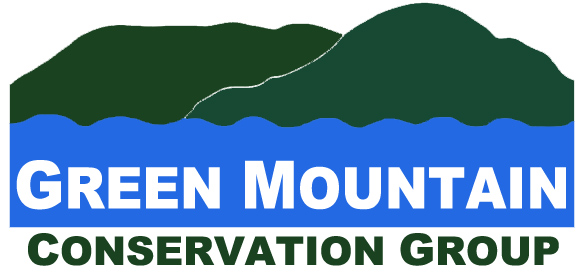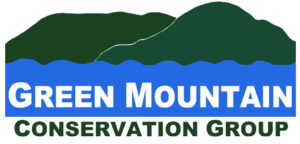The following video is a recording of the presentation Groundwater Resources in Tamworth: Source and Protection on Wednesday, September 28, 2022 by geologist Bob Newton hosted by the Tamworth Groundwater Protection Ordinance Committee.
2021 Source Water Protection Workshop in Review
On November 17, 2021, community planners, public water suppliers and the public came together on Zoom to learn more about recommended protection measures for water resources in their town from Pierce Rigrod of the New Hampshire Department of Environmental Services. Mr. Rigrod works with communities and public water systems to develop protection strategies for water resources, groundwater and drinking water resources. He supervises source water protection programs within the Planning, Protection & Assistance Section, including Chemical Monitoring Waivers, Local Source Protection Grants, Best Management Practices for Groundwater Protection, and the State Groundwater Reclassification program, and provides local technical assistance on source protection and private well testing. This workshop was geared towards planning board members, select boards, conservation commissioners, zoning boards, code enforcement officers, health inspectors, public water suppliers and anyone interested in learning more about on-the-ground development and implementation of recommended tools such as Groundwater Protection Ordinances, Groundwater Reclassification, and Source Water Protection Plans. At the end, participants asked questions specific to their town and protection districts in order to gain a better understanding of how to enhance drinking water protection for their town’s water supplies. View the recorded workshop on this page.
2018 Andrew Madison for Drinking Water Protection Workshop in Review
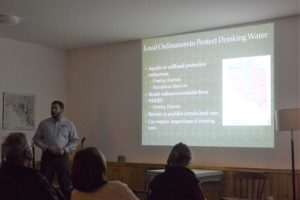
Andrew Madison presents at the Drinking Water Protection Workshop
In 2018, Green Mountain Conservation Group (GMCG) hosted the Ossipee Watershed Drinking Water Protection Workshop on November 28. At the workshop, Andrew Madison, Source Water Protection Coordinator of the NH Department of Environmental Services (NHDES), highlighted the importance of local drinking water resources and how we can all work to better protect them from contamination.
In his presentation, Madison described the different types of public drinking water systems: community, transient, and non-transient non-community. Most residents in the Ossipee Watershed region have private wells as their main source of drinking water, and therefore, he emphasized, it is up to them to make sure their drinking water is safe. In fact, the state of New Hampshire does not regulate or monitor private wells at all. Private well owners should have their water tested for bacteria and nitrate every year, and NHDES recommends standard and radiological analysis testing every three to five years. NHDES provides an online sampling request form to get started[1].
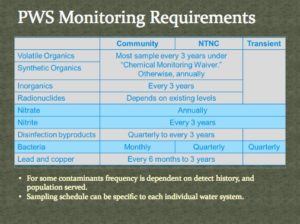
Source: Andrew Madison, NHDES
Public Water Systems (PWS) have different regulations and requirements for testing due to the time of the year that they operate, the amount of people they service, etc. A community PWS could be a town or a coop, and by definition, supplies water to the same population year-round. A transient PWS could be a gas station, hotel, restaurant, etc. and supplies water to a place where people do not remain for long periods of time. The third type of PWS: non-transient non-community water systems, are considered places such as schools, office buildings, or hospitals, where public water is regularly supplied to at least 25 of the same people, at least six months per year, but not year-round.
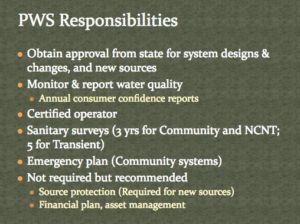
Source: Andrew Madison, NHDES
PWS have multiple responsibilities including but not limited to: obtaining approval from the State for system designs and changes such as a changes in their water source or treatment methods, and monitoring their water quality with a certified operator. Community PWS’ also are required to publish annual consumer confidence reports highlighting their water quality results.
Madison informed participants that most communities in the Ossipee watershed are dependent on groundwater. The protection of groundwater is incredibly important in maintaining healthy drinking water for both NH residents’ private and public wells. There are a variety of resources that individuals and communities can use to better protect groundwater, whether it is a wellhead protection area around a school, summer camp, condominium complex, campground, or an aquifer that is sensitive to contamination and shared by multiple towns.
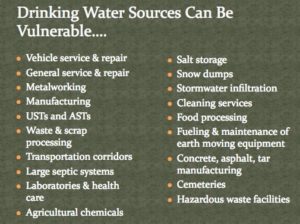
Source: Andrew Madison, NHDES
Grants, such as the NHDES Local Source Water Protection Grant , are a great way to receive funding assistance for projects aimed at protecting water resources. In the past, this grant has allowed emergency response personnel to update their equipment and receive better training in case of a spill. Towns can also receive assistance to create a Source Water Protection Plan or enact a Groundwater Protection Ordinance, which creates a groundwater protection overlay district, and includes performance standards for regulated substances within the overlay district, such as requiring Best Management Practices (BMPs) for stormwater management and for storage of manure, fertilizer, and compost, in addition to prohibiting certain uses, such as solid waste landfills, junkyards, bulk road salt storage, and snow dumps in the overlay district.. In 2009, GMCG assisted the towns of Sandwich, Tamworth, Ossipee, Effingham, Freedom, and Madison in long-term planning efforts to protect their drinking water resources to update or adopt groundwater protection ordinances. As of 2018, Sandwich, Ossipee, Effingham, Freedom and Madison had established groundwater protection ordinances in place. The state’s model groundwater protection ordinance[2] can be modified to suit individual town needs.
Municipalities can also take action by way of submitting a request to DES for groundwater reclassification: the process of reclassifying local groundwater to a higher class if safe from contamination to better regulate it for drinking water safety. If accepted by DES, the municipality is responsible for managing the potential contamination sources. More information on the drinking water reclassification process can be found on their site[3].
When it comes to protecting drinking water, Madison stressed the importance of different communities and even different states working together. Water knows no political boundaries, and is best protected when multiple communities work together. Collaboration among watershed groups, municipalities, and many more will be critical to maintaining healthy drinking water in the state of NH. He also emphasized the importance of education and outreach, stating: “Education and outreach as a tool are one of your best defenses against contamination.”
Click here for Andrew’s full presentation
http://www4.des.state.nh.us/DESOnestop/HOBottles.aspx to request a sampling kit
